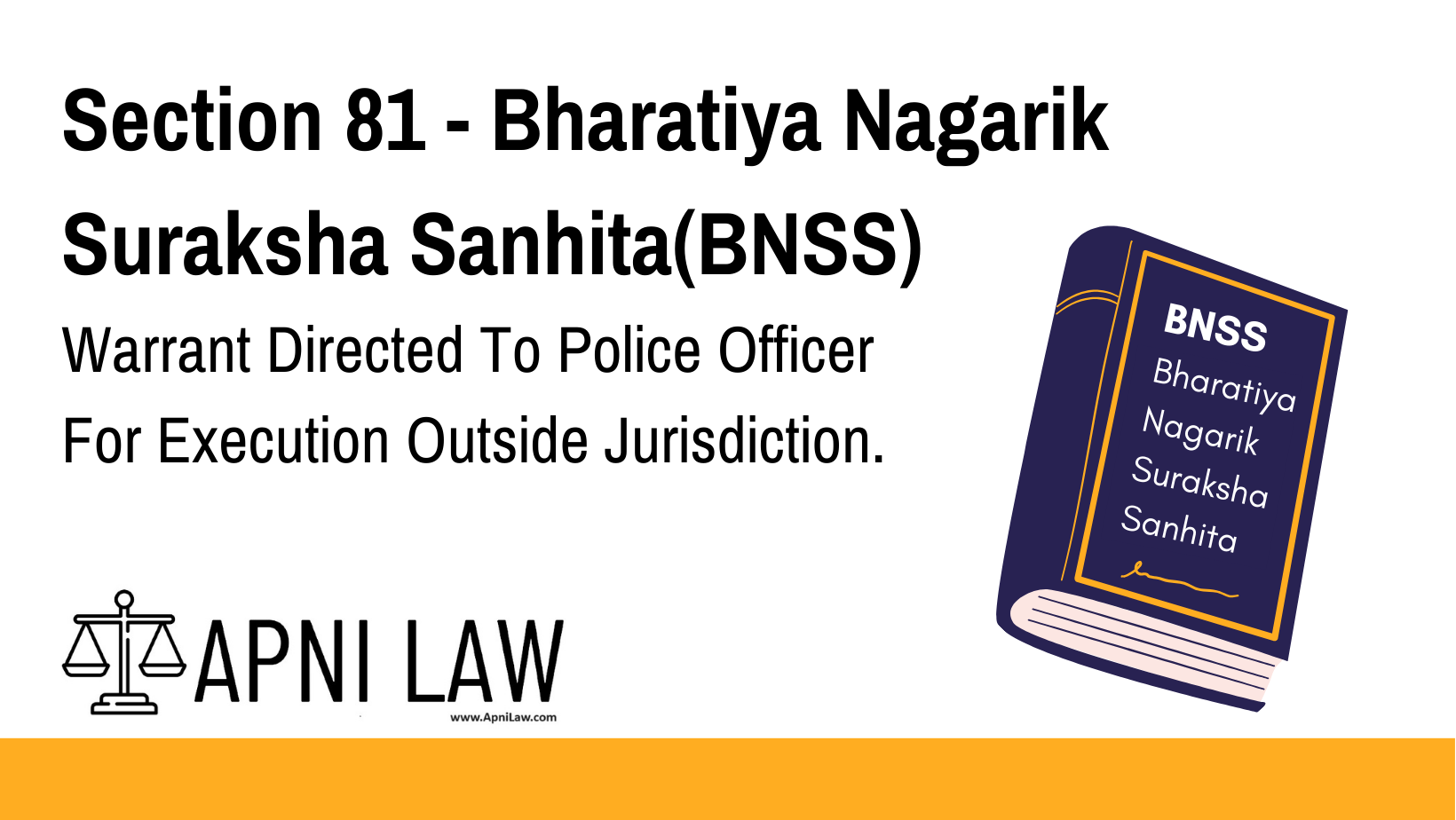Code: Section 81 BNSS
Execution of Warrant Beyond Local Jurisdiction
(1) When a warrant directed to a police officer is to be executed beyond the local
jurisdiction of the Court issuing the same, he shall ordinarily take it for endorsement either
to an Executive Magistrate or to a police officer not below the rank of an officer in charge of
a police station, within the local limits of whose jurisdiction the warrant is to be executed.
(2) Such Magistrate or police officer shall endorse his name thereon and such
endorsement shall be sufficient authority to the police officer to whom the warrant is
directed to execute the same, and the local police shall, if so required, assist such officer in
executing such warrant.
(3) Whenever there is reason to believe that the delay occasioned by obtaining the
endorsement of the Magistrate or police officer within whose local jurisdiction the warrant
is to be executed will prevent such execution, the police officer to whom it is directed may
execute the same without such endorsement in any place beyond the local jurisdiction of
the Court which issued it.
Explanation of Section 81 BNSS
Section 81 BNSS outlines the procedure for executing a warrant beyond the local jurisdiction of the issuing Court. It ensures that law enforcement officers can efficiently execute warrants while adhering to procedural safeguards.
Key Provisions of Section 81 BNSS
-
Endorsement by Local Authorities:
- If a warrant is to be executed outside the issuing Court’s jurisdiction, the police officer must first seek endorsement from an Executive Magistrate or a police officer of appropriate rank in the jurisdiction where the warrant is to be executed.
- This endorsement validates the warrant and ensures local law enforcement cooperation.
-
Authority to Execute the Warrant:
- Once endorsed, the police officer to whom the warrant is issued can proceed with execution.
- Local police are required to assist if necessary.
-
Exception for Urgent Cases:
- If there is a risk of delay preventing execution, the police officer can execute the warrant without obtaining prior endorsement.
- This provision ensures that accused persons do not escape due to procedural delays.
This section balances procedural compliance with practical enforcement, allowing police officers flexibility while maintaining legal oversight.
Illustration
Example 1: Warrant Executed with Endorsement
A Delhi Court issues a warrant against a person residing in Kolkata. The Delhi police officer takes the warrant to a Kolkata Executive Magistrate for endorsement before proceeding with execution.
Example 2: Warrant Executed Without Endorsement Due to Urgency
A police officer has a warrant for a fugitive located in Bangalore. He learns that the accused is about to flee the country. Since obtaining prior endorsement would cause delays, the officer executes the warrant immediately without waiting.
Common Questions and Answers on Section 81 BNSS
1. Why is endorsement required before executing a warrant in another jurisdiction?
- Endorsement ensures local law enforcement awareness and cooperation in executing the warrant.
2. Can a police officer execute a warrant without endorsement?
- Yes, but only if obtaining endorsement would cause delays that might prevent execution (as per Sub-section (3)).
3. Who can endorse the warrant?
- An Executive Magistrate or a police officer not below the rank of an officer in charge of a police station in the jurisdiction where the warrant is to be executed.
4. Is local police assistance mandatory in executing the warrant?
- Yes, once endorsed, local police must assist if required (as per Sub-section (2)).
5. Can an accused challenge a warrant executed under Section 81 BNSS?
- The accused can challenge the legality of the warrant or execution process in Court, but the execution remains valid as long as it follows legal procedures.
Conclusion
Section 81 BNSS facilitates the execution of warrants across jurisdictions while ensuring procedural oversight. By mandating endorsement for regular cases and allowing direct execution in urgent cases, it maintains a balance between legal compliance and practical law enforcement needs.
For more legal insights, visit ApniLaw!











